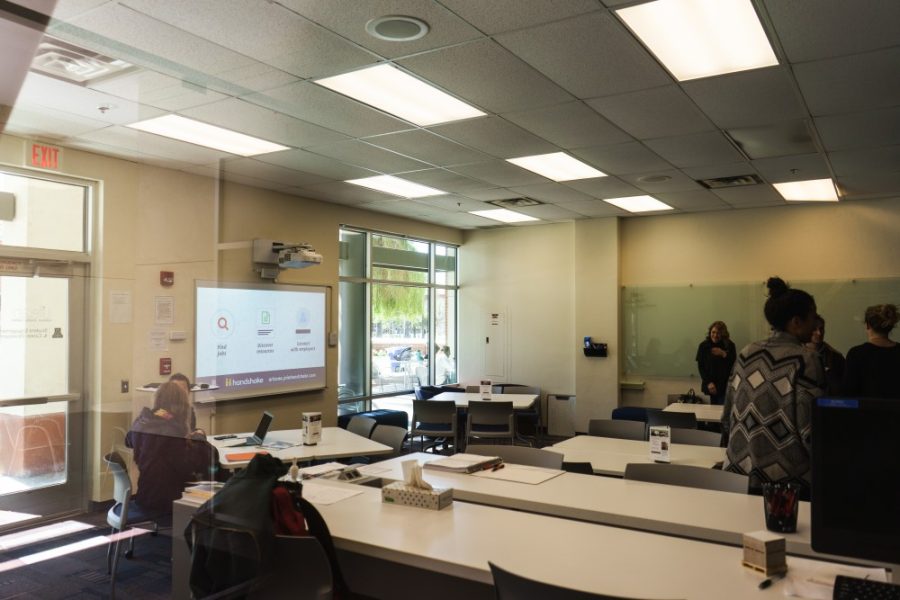It is a place you have almost certainly walked by if you were on campus at the University of Arizona last semester. You probably wondered at the time what it was with its offices, brightly painted walls and meeting rooms. It was the UA’s LifeLab.
Student Engagement and Career Development’s LifeLab, located on the ground level of the Student Union Memorial Center, served over 1,000 students last semester, providing resume pointers, career advice and engagement opportunities.
“Oftentimes, when students think about career services, they are getting ready to apply for a job or are getting close to graduation,” said Devon Thomas, senior coordinator for student engagement. “LifeLab does more than just look at resumes, though; it helps students think through big questions such as ‘Where am I going in life?’ and ‘Is this opportunity right for me?’”
RELATED: Job Shadow Program provides opportunity to get a taste of industry
Students can walk into LifeLab any time Monday, Wednesday and Friday between 1-4 p.m. and Tuesday and Thursday between 3-6 p.m. and meet with a peer mentor or a faculty fellow.
The goal of LifeLab, according to Annie Kurtin, associate director for student engagement, is that every student that comes to the LifeLab leaves with a concrete next step to take in the pursuit of their goals. According to a survey of students who used the service during its first active semester, 94 percent of students felt they had accomplished this.
Amanda Starsiak, an economics junior at UA, has worked as a peer educator for LifeLab since its inception. Starsiak’s training for the position focused on helping students find these next steps and think about their future careers and academic paths.
“LifeLab is a space for students when they are unsure and want to evaluate their next steps,” Starsiak said. “I want to make an impact in students lives and when a student comes in and is really concerned or feels lost and you are able to give them a resource or a next step, their mood lightens a bit.”
LifeLab teams up with companies who actively recruit UA students to help connect students with opportunities and learn what skills companies are looking for in their employees, according to Kurtin.
“At LifeLab, we help students articulate the transferable skills they developed in their coursework and other experiences in the context of a career,” Kurtin said.
According to Kurtin, helping students articulate their skills through mock interviews with staff is critical, as is helping students find engagement opportunities on campus.
Kathy Koppy, a career educator for student engagement, is one of the professional staff LifeLab has on hand for students to talk with.
“There is no one right path for students, and we recognize that, so a lot of what we do at LifeLab is exploration,” Koppy said.
Koppy said many students think they will pick a major and graduate from college and then have the same job for the rest of their lives. According to Koppy, though, a career is a process that involves evaluating changing values, experiences and exploration for the rest of your life.
Students do not have to have everything figured out Koppy said. Koppy herself was previously a high school teacher before coming to work at the UA.
“Our job at LifeLab is to support and listen to students and provide resources,” Koppy said. “We reassure students they will be able to figure everything out and that every student is on a different timeline and that is okay.”
RELATED: UA unveils new, far-reaching Strategic Plan
By teaming up with campus advisers and classes, LifeLab was able to get the word out about the new resources they are offering for students and draw in a diverse population of students.
Close to one third of students using LifeLab last year were first-generation students, and over 55 percent were freshmen, two populations of students who benefit a lot from LifeLab’s resources, Kurtin said.
LifeLab hopes to continue to expand and serve more students on campus, Kurtin said. It is continuing to team up with undergraduate research advisers on campus and individual departments and is also developing a mobile career advising service to be able to meet students where they are at, in the dorms or other locations and with flexible hours, according to Kurtin.
For Kurtin, LifeLab’s core mission is to help connect students with resources on campus so that when they graduate, they walk away from the UA with not just a degree, but with the skills needed to find a job and career.
Follow Randall Eck on Twitter








